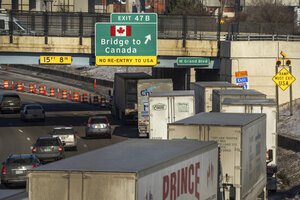Canadian provinces lift COVID restrictions, protests remain

TORONTO (AP) — A rapidly growing list of Canadian provinces moved to lift their COVID-19 restrictions as protesters decrying virus precautions kept up the pressure with truck blockades Wednesday in the capital and at key U.S. border crossings, including the economically vital bridge to Detroit.
Alberta, Saskatchewan, Quebec and Prince Edward Island announced plans this week to roll back some or all measures, with Alberta, Canada’s most conservative province, dropping its vaccine passport for places such as restaurants immediately and getting rid of masks at the end of the month.
Alberta opposition leader Rachel Notley accused Alberta Premier Jason Kenney of allowing an “illegal blockade to dictate public health measures.”
Protesters have been blocking the border crossing at Coutts, Alberta, for more than a week and a half. About 50 trucks remained there Wednesday.
Also, more than 400 trucks have paralyzed downtown Ottawa, Canada’s capital, in a protest that began late last month.
And a blockade by people mostly in pickup trucks entered its third day at the Ambassador Bridge between Detroit and Windsor, Ontario. Traffic was prevented from entering Canada, while some U.S.-bound traffic was still moving.
The bridge carries 25% of all trade between Canada and the U.S., and Canadian lawmakers expressed increasing worry about the economic effects.
The “freedom truck convoy” has been promoted by Fox News personalities and attracted support from many U.S. Republicans, including former President Donald Trump, who called Prime Minister Justin Trudeau a “far left lunatic” who has “destroyed Canada with insane Covid mandates.”
Some demonstrators are protesting a rule that took effect Jan. 15 requiring truckers entering Canada to be fully immunized against the coronavirus. But the protests have also encompassed grievances about masks and other COVID-19 restrictions and a hatred of Trudeau.
Protesters have been calling for the removal of his government, although most of the restrictive measures were put in place by provincial governments.
Pandemic restrictions have been far stricter in Canada than in the U.S., but Canadians have largely supported them. Canada’s COVID-19 death rate is one-third that of the U.S.
“We’re all tired, yes, we’re all frustrated, but we continue to be there for each other. We continue to know that science and public health rules and guidance is the best way through this pandemic,” Trudeau said on Ottawa’s Parliament Hill.
The latest COVID-19 wave fueled by the highly contagious omicron variant has crested in Canada, which is one of the most vaccinated countries in the world. More than 84% have received at least one dose.
Despite Alberta’s plans to scrap the public health measures, the protest there continued.
“We’re here for the big picture. It started with the border thing, it started with Trudeau, and until Trudeau moves, we don’t move,” said John Vanreeuwyk, a feedlot operator from Coaldale, Alberta.
About 90% of truckers in Canada are vaccinated, and trucker associations and many big-rig operators have denounced the protests. The U.S. has the same vaccination rule for truckers entering the country, so it would make little difference if Trudeau lifted the restriction.
“The protests in Ottawa Canada and the Ambassador Bridge are less and less about vaccines and more and more about political extremism and desires to disrupt the Canadian government and economy (done with external radical influences and money),” Bruce Heyman, a former U.S. Ambassador to Canada, tweeted.
When Kenney, the Conservative Alberta premier, announced late Tuesday the lifting of restrictions, he likened the stigmatization the unvaccinated face to how people with the AIDS virus were treated in the 1980s. Kenney apologized Wednesday.
The impasse in Alberta has stranded travelers and cross-border truckers, disrupted millions of dollars in trade and impeded access to basic goods and medical services for area residents.
“We’ve got guys here — they’ve lost everything due to these mandates and they’re not giving up and they’re willing to stand their ground and keep going until this is done,” Vanreeuwyk said.
Garrett Buchanan drove 10 hours from High Prairie in northern Alberta to join the protest and said he is staying until their demands are met.
“Yeah — until the mandates get dropped, and if they can work on getting (Trudeau) out, I’d stay longer for that, too,” he said.
Coutts Mayor Jim Willett said he had hoped the provincial government would go further in its announcement and isn’t expecting things to return to normal any time soon.
“Leaving masking until March 1 is not going to make anybody happy,” he said.
You Might Also Like



